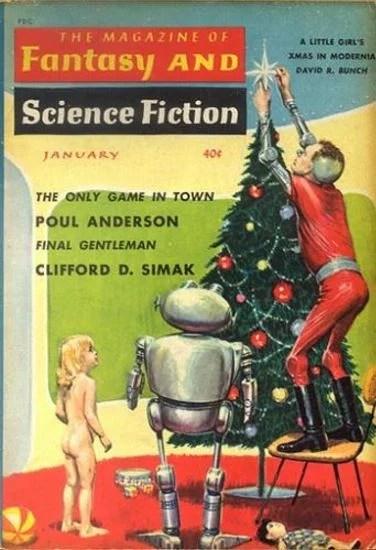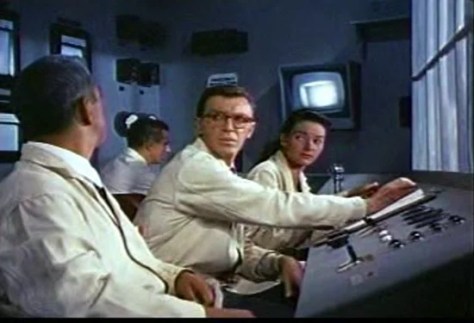Good Lord, is it already 1960?
When I started this endeavor in 1958, I had only a vague notion what it would look like and how long it would last. Over the past year 14 months, Galactic Journey has settled into what I hope is a consistent, yet varied, mature column. Moreover, I have suspicion that this column will last just about as long as I do, as I see no reason to ever stop.
It is hard to imagine Galactic Journey with bylines dated with futuristic years like 1965 or 1972 or 1988, but why not? Perhaps one day, instead of San Diego, Seattle, or Sapporo, the dateline will read Sinus Rorus, Syrtis Major, or Saturn.

Returning to the present, it must be 1960, for that is the date on the current Fantasy and Science Fiction, January to be exact. Actually, the February issue has already arrived, but that's a topic for a future week. In the meantime, let's see what the first F&SF of 1960 has to offer:
Poul Anderson is back with another Time Patrol story, The Only Game in Town. This time, Everard and his faithful Indian companion (I kid; Salgado is quite a well-developed and co-equal character) are dispatched to the American Southwest in the 13th century to stop, get this, a Mongol invasion.
It's not so silly as it sounds. In fact, it sounds downright plausible that the Mongols could, after conquering China, send a scouting expedition to the New World. It didn't take many horsemen to conquer the Aztecs, and the Mongols were a formidable race, to be sure. What makes this story interesting, aside from the fine writing and evocative setting, is Everard's dawning realization that the Time Patrol's mission may not be as pure as once thought. The Time Cops are told they are to preserve the original timeline, but in this story, they appear to be meddling for meddling's sake rather than fixing damage caused by others.
I look forward to learning more about the secret agenda of Everard's future employers.
Then we have A Divvil with the Women, apparently a resubmission of an earlier story once published in a lesser magazine. It's by Eric Frank Russell (slumming as "Niall Wilde"), and it involves an unpleasant fellow who makes a deal with the devil—with disastrous results, of course. My, but these stories are popular these days! It's no longer than it needs to be to deliver the punchline, which is a blessing (pun intended).
Damon Knight has translated a piece from F&SF's French edition: The Blind Pilot by Charles Henneberg. Sadly, the thing is only half-translated or something; it's well nigh unreadable, and I didn't make it past the first few pages. Oh well.
Reginald Bretnor, who writes the execrable Ferdinand Feghoot puns in F&SF under a pseudonym, has a very silly short-short ("Bug-Getter") that, you guessed it, ends in a pun. I must confess that I did laugh, so it couldn't have been all bad.
For once, Asimov has a decidedly unremarkable article. It's called Those Crazy Ideas, and it segues from a discussion of Asimov's personal creativity to observations on how scientific creativity can be maximized. Fluffy.
Cliff Simak's Final Gentleman just barely misses the mark. Quite a long tale for F&SF, it is one of those excitingly creepy tales with a prosaic payoff. In this case, a respected author retires after 30 years only to find that the trappings and details of his life are largely imaginary, sort of a psychic cloak that surrounds him, altering his surroundings and himself to seem more refined and engaging than they actually are. I found this notion compelling. After all, I often swathe myself in a fantasy, pretending to be decades in the past. I complete the illusion by listening to old music, using obsolete slang, wearing out-of-date clothing. It is a conceit in which I engage to better understand a bygone era for historical purposes, and simply to have a fun invisible refuge from the real world. Hey—it's cheaper than heroin.
But in Simak's story, the psychic hoodwink is perpetrated solely to influence the course of history through an implausible Rube Goldberg chain of interactions. I was disappointed, but you may feel differently.
A Little Girl's Christmas in Modernia, by Ralph Bunch, is next. In this future, we gradually trade in our flesh parts for metal as we grow older. Bunch's tale features a fully human moppet and her mostly-converted parents in the kind of inconsequential story I'd expect to find in a slick. I suppose they needed a Holiday-themed story to fill out this issue.
What do you do when an alien weather probe crashes into your backyard? You bake it, of course, and thus unintentionally forestall an extraterrestrial invasion. G.C. Edmondson's The Galactic Calabash is fun, though it took me several sessions to get through the short story, largely because I always picked it up at bedtime.
Rounding out the magazine is the quite good Double Double, Toil and Trouble by Holley Cantine. An anarchist turned recluse decides to take up magic, eventually learning the secret to doubling anything. It starts out well enough, but the ending provides a cautionary tale against dabbling in the Dark Arts. Holley Cantine, I understand, is a bit of a political theorist, and Double has a deeper message wrapped in a gentle fiction coating.
And so the January 1960 F&SF ends as it began with a four-star story. In-between, there lies a muddle of uncharacteristic unevenness such that the whole issue clocks in at a mere three stars, the same as this month's Astounding.
That just leaves us with the January IF, whose reading is in progress. In the meantime, I'll soon have a report on my latest excursion to the drive-in with my daughter. It don't all gotta be highbrow, after all.
Happy New Year!

Note: If you like this column, consider sharing it by whatever media you frequent most. I love the company, and I imagine your friends share your excellent taste!
P.S. Galactic Journey is now a proud member of a constellation of interesting columns. While you're waiting for me to publish my next article, why not give one of them a read!

(Confused? Click here for an explanation as to what's really going on)
This entry was originally posted at Dreamwidth, where it has  comments. Please comment here or there.
comments. Please comment here or there.




comments. Please comment here or there.
























